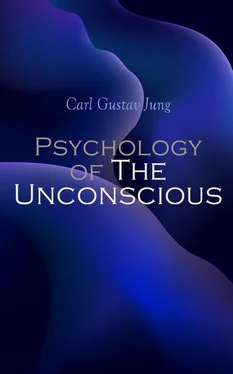“A further important result of that co-operation of sound and sign interchange consists in the fact that very many words gradually lose altogether their original concrete thought meaning, and turn into signs for general ideas and for the expression of the apperceptive functions of relation and comparison and their products. In this manner abstract thought develops, which, because it would not be possible without the change of meaning lying at the root of it, is indeed a production of that psychic and psychophysical reciprocal action out of which the development of language takes place.”
Jodl [23]denies the identity of language and thought, because, for one reason, one and the same psychic fact might be expressed in different languages in different ways. From that he draws the conclusion that a “super-language thinking” exists. Certainly there is such a thing, whether with Erdmann one considers it “hypologisch,” or with Jodl as “super-language.” Only this is not logical thinking. My conception of it agrees with the noteworthy contribution made by Baldwin, which I will quote here word for word. [24]
“The transmission from pre-judgmental to judgmental meaning is just that from knowledge which has social confirmation to that which gets along without it. The meanings utilized for judgment are those already developed in their presuppositions and applications through the confirmation of social intercourse. Thus, the personal judgment, trained in the methods of social rendering, and disciplined by the interaction of its social world, projects its content into that world again. In other words, the platform for all movement into the assertion of individual judgment—the level from which new experience is utilized—is already and always socialized; and it is just this movement that we find reflected in the actual results as the sense of the ‘appropriateness’ or synomic character of the meaning rendered.
“Now the development of thought, as we are to see in more detail, is by a method essentially of trial and error, of experimentation, of the use of meanings as worth more than they are as yet recognized to be worth. The individual must use his own thoughts, his established knowledges, his grounded judgments, for the embodiment of his new inventive constructions. He erects his thought as we say ‘schematically’—in logic terms, ‘problematically,’ conditionally, disjunctively; projecting into the world an opinion still peculiar to himself, as if it were true. Thus all discovery proceeds. But this is, from the linguistic point of view, still to use the current language, still to work by meanings already embodied in social and conventional usage.
“Language grows, therefore, just as thought does, by never losing its synomic or dual reference; its meaning is both personal and social.
“It is the register of tradition, the record of racial conquest, the deposit of all the gains made by the genius of individuals.... The social copy-system, thus established, reflects the judgmental processes of the race, and in turn becomes the training school of the judgment of new generations.
“Most of the training of the self, whereby the vagaries of personal reaction to fact and image are reduced to the basis of sound judgment, comes through the use of speech. When the child speaks, he lays before the world his suggestion for a general or common meaning. The reception he gets confirms or refutes him. In either case he is instructed. His next venture is now from a platform of knowledge on which the newer item is more nearly convertible into the common coin of effective intercourse. The point to notice here is not so much the exact mechanism of the exchange—secondary conversion—by which this gain is made, as the training in judgment that the constant use of it affords. In each case, effective judgment is the common judgment.
“Here the object is to point out that it is secured by the development of a function whose rise is directly ad hoc , directly for the social experimentation by which growth in personal competence is advanced as well— the function of speech .
“In language, therefore, to sum up the foregoing, we have the tangible—the actual—the historical—instrument of the development and conservation of psychic meaning. It is the material evidence and proof of the concurrence of social and personal judgment . In it synomic meaning, judged as ‘appropriate,’ becomes ‘social’ meaning, held as socially generalized and acknowledged.”
These arguments of Baldwin abundantly emphasize the wide-reaching limitations of thinking caused by language. [25]These limitations are of the greatest significance, both subjectively and objectively; at least their meaning is great enough to force one to ask one’s self if, after all, in regard to independence of thought, Franz Mauthner, thoroughly sceptical, is not really correct in his view that thinking is speech and nothing more. Baldwin expresses himself more cautiously and reservedly; nevertheless, his inner meaning is plainly in favor of the primacy of speech (naturally not in the sense of the spoken word); the directed thinking, or as we might perhaps call it, the thinking in internal speech, is the manifest instrument of culture, and we do not go astray when we say that the powerful work of education which the centuries have given to directed thinking has produced, just through the peculiar development of thinking from the individual subjective into the social objective, a practical application of the human mind to which we owe modern empiricism and technic, and which occurs for absolutely the first time in the history of the world. Inquisitive minds have often tormented themselves with the question why the undoubtedly extraordinary knowledge of mathematics and principles and material facts united with the unexampled art of the human hand in antiquity never arrived at the point of developing those known technical statements of fact, for instance, the principles of simple machines, beyond the realm of the amusing and curious to a real technic in the modern sense. There is necessarily only one answer to this; the ancients almost entirely, with the exception of a few extraordinary minds, lacked the capacity to allow their interest to follow the transformations of inanimate matter to the extent necessary for them to be able to reproduce the process of nature, creatively and through their own art, by means of which alone they could have succeeded in putting themselves in possession of the force of nature. That which they lacked was training in directed thinking, or, to express it psychoanalytically, the ancients did not succeed in tearing loose the libido which might be sublimated, from the other natural relations, and did not turn voluntarily to anthropomorphism. The secret of the development of culture lies in the mobility of the libido , and in its capacity for transference. It is, therefore, to be assumed that the directed thinking of our time is a more or less modern acquisition, which was lacking in earlier times.
But with that we come to a further question, viz., what happens if we do not think directedly? Then our thinking lacks the major idea, and the feeling of direction which emanates from that. [26]We no longer compel our thoughts along a definite track, but let them float, sink and mount according to their own gravity. According to Kulpe [27]thinking is a kind of inner will action, the absence of which necessarily leads to an automatic play of ideas. James understands the non-directed thinking, or “merely associative” thinking, as the ordinary one. He expresses himself about that in the following manner:
“Our thought consists for the great part of a series of images, one of which produces the other; a sort of passive dream-state of which the higher animals are also capable . This sort of thinking leads, nevertheless, to reasonable conclusions of a practical as well as of a theoretical nature.
Читать дальше












